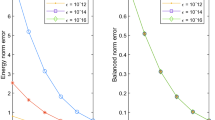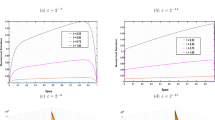Abstract
The current study aims to develop an error analysis for non-linear parabolic singularly perturbed reaction–diffusion problems using element-free Galerkin method. A robust numerical methodology is introduced based on combining the implicit Crank–Nicolson scheme for temporal derivatives and the element-free Galerkin (EFG) method for spatial derivatives. The moving least-squares (MLS) approximation has been employed to generate the shape functions. Essential boundary conditions have been enforced by the incorporation of the Lagrange multiplier method. Due to the presence of steep boundary layers in the solution of the considered problem, a piecewise-uniform layer-adapted Shishkin’s technique has been used to generate nodal points at the transition point. The stability and error analysis of the present method on a discrete \(L^{2}-\)norm is analyzed in an innovative theoretical framework. The \(\epsilon\)-uniform convergency of the fully-discrete EFG method is shown to be \(\mathcal {O}(\tau ^{2}+d_{s}^{m})\), where \(\tau\) and \(d_{s}^{m}\) are the time step size and size of the influence domain, respectively. The Lagrange multiplier method has been incorporated to deal with the implementation of essential boundary conditions. Lastly, a few numerical experiments are performed to validate the theoretical results and verify the computational consistency and robustness of the proposed scheme. The \(L_{\infty }\) errors and the convergence rate have been presented.








Similar content being viewed by others
Data Availability
The data sets supporting the results presented in the study have been generated using the MATLAB code. No external data files are used in the present work.
References
Bansal K, Rai P, Sharma KK (2017) Numerical treatment for the class of time dependent singularly perturbed parabolic problems with general shift arguments. Differ Equ Dyn Syst 25(2):327–346
Bullo TA, Duressa GF, Degla GA (2021) Robust finite difference method for singularly perturbed two-parameter parabolic convection–diffusion problems. Int J Comput Methods 18(02):2050034
Chandru M, Das P, Ramos H (2018) Numerical treatment of two-parameter singularly perturbed parabolic convection diffusion problems with non-smooth data. Math Methods Appl Sci 41(14):5359–5387
Chandru M, Prabha T, Das P, Shanthi V (2019) A numerical method for solving boundary and interior layers dominated parabolic problems with discontinuous convection coefficient and source terms. Differ Equ Dyn Syst 27(1):91–112
Cheng O, Jia-qi M (2005) The nonlinear singularly perturbed problems for predator–prey reaction diffusion equations. J Biomath 20(2):135–141
Das P (2015) Comparison of a priori and a posteriori meshes for singularly perturbed nonlinear parameterized problems. J Comput Appl Math 290:16–25
Das P (2018) A higher order difference method for singularly perturbed parabolic partial differential equations. J Differ Equ Appl 24(3):452–477
Das P, Natesan S (2014) Optimal error estimate using mesh equidistribution technique for singularly perturbed system of reaction–diffusion boundary-value problems. Appl Math Comput 249:265–277
Das P, Rana S, Ramos H (2022) On the approximate solutions of a class of fractional order nonlinear volterra integro-differential initial value problems and boundary value problems of first kind and their convergence analysis. J Comput Appl Math 404:113116
Kadalbajoo M, Sharma K (2005) Numerical treatment of boundary value problems for second order singularly perturbed delay differential equations. Comput Appl Math 24:151–172
Kaur J, Sangwan V (2021) Exponentially fitted element-free Galerkin approach for nonlinear singularly perturbed problems. J Math 2021:1–18
Kumar D (2018) An implicit scheme for singularly perturbed parabolic problem with retarded terms arising in computational neuroscience. Numer Methods Partial Differ Equ 34(6):1933–1952
Kumar D, Kadalbajoo MK (2011) A parameter-uniform numerical method for time-dependent singularly perturbed differential–difference equations. Appl Math Model 35(6):2805–2819
Kumar BR, Kumar S (2015) Convergence of three-step Taylor galerkin finite element scheme based monotone schwarz iterative method for singularly perturbed differential–difference equation. Numer Funct Anal Optim 36(8):1029–1045
Kumar S, Kumar BR (2017) A finite element domain decomposition approximation for a semilinear parabolic singularly perturbed differential equation. Int J Nonlinear Sci Numer Simul 18(1):41–55
Kumar S, Kumar BR, Boonkkamp JTT (2019) Complete flux scheme for elliptic singularly perturbed differential–difference equations. Math Comput Simul 165:255–270
Kumar K, Podila PC, Das P, Ramos H (2021) A graded mesh refinement approach for boundary layer originated singularly perturbed time-delayed parabolic convection diffusion problems. Math Methods Appl Sci 44(16):12332–12350
Lancaster P, Salkauskas K (1981) Surfaces generated by moving least squares methods. Math Comput 37(155):141–158
Miller JJ, Oriordan E, Shishkin GI (1996) Fitted numerical methods for singular perturbation problems: error estimates in the maximum norm for linear problems in one and two dimensions. World scientific, Singapore
Murray JD (2002) Mathematical biology: I. An introduction. Springer, New York
Parthiban S, Valarmathi S, Franklin V (2015) A numerical method to solve singularly perturbed linear parabolic second order delay differential equation of reaction-diffusion type. Malaya J Matematik 18:412–20
Rana S, Das P (2020) Theoretical prospects of the solutions of fractional order weakly singular volterra integro differential equations and their approximations with convergence analysis
Rashidinia J, Barati A, Nabati M (2014) Application of sinc-Galerkin method to singularly perturbed parabolic convection–diffusion problems. Numer Algorith 66(3):643–662
Roos H-G, Stynes M, Tobiska L (2008) Robust numerical methods for singularly perturbed differential equations: convection-diffusion-reaction and flow problems, vol 24. Springer, New York
Roos H-G, Stynes M, Tobiska L (2008) Robust numerical methods for singularly perturbed differential equations: convection–diffusion-reaction and flow problems, vol 24. Springer, New York
Sangwan V, Kumar BVR (2012) Finite element analysis for mass-lumped three-step Taylor Galerkin method for time dependent singularly perturbed problems with exponentially fitted splines. Numer Funct Anal Optim 33(6):638–660
Shakti D, Mohapatra J, Das P, Vigo-Aguiar J (2022) A moving mesh refinement based optimal accurate uniformly convergent computational method for a parabolic system of boundary layer originated reaction-diffusion problems with arbitrary small diffusion terms. J Comput Appl Math 404:113167
Sun F, Wang J, Cheng Y, Huang A (2015) Error estimates for the interpolating moving least-squares method in n-dimensional space. Appl Numer Math 98:79–105
Tefera DM, Tirunehi AA, Derese GA (2024) Absolutely stable fitted mesh scheme for singularly perturbed parabolic convection diffusion equations. In: Lente G (ed) Reaction kinetics, mechanisms and catalysis. Springer, Cham, pp 1–22
Thalhammer M (2004) On the convergence behaviour of variable stepsize multistep methods for singularly perturbed problems. BIT Numer Math 44(2):343–361
Tian H (2003) Asymptotic expansion for the solution of singularly perturbed delay differential equations. J Math Anal Appl 281(2):678–696
Tiruneh AA, Derese GA, Tefera DM (2022) A nonstandard fitted operator method for singularly perturbed parabolic reaction-diffusion problems with a large time delay. Int J Math Math Sci 2022:1–11
Wu J (1996) Theory and applications of partial functional differential equations, vol 119. Springer, New York
Author information
Authors and Affiliations
Corresponding author
Ethics declarations
Conflict of interest
The authors declare no conflicts of interest in this study.
Additional information
Publisher's Note
Springer Nature remains neutral with regard to jurisdictional claims in published maps and institutional affiliations.
Rights and permissions
Springer Nature or its licensor (e.g. a society or other partner) holds exclusive rights to this article under a publishing agreement with the author(s) or other rightsholder(s); author self-archiving of the accepted manuscript version of this article is solely governed by the terms of such publishing agreement and applicable law.
About this article
Cite this article
Kaur, J., Sangwan, V. & Kumar, R. Error estimation for non-linear singularly perturbed reaction–diffusion parabolic problems via element-free Galerkin method. Reac Kinet Mech Cat 137, 1255–1281 (2024). https://doi.org/10.1007/s11144-024-02630-0
Received:
Accepted:
Published:
Issue Date:
DOI: https://doi.org/10.1007/s11144-024-02630-0




